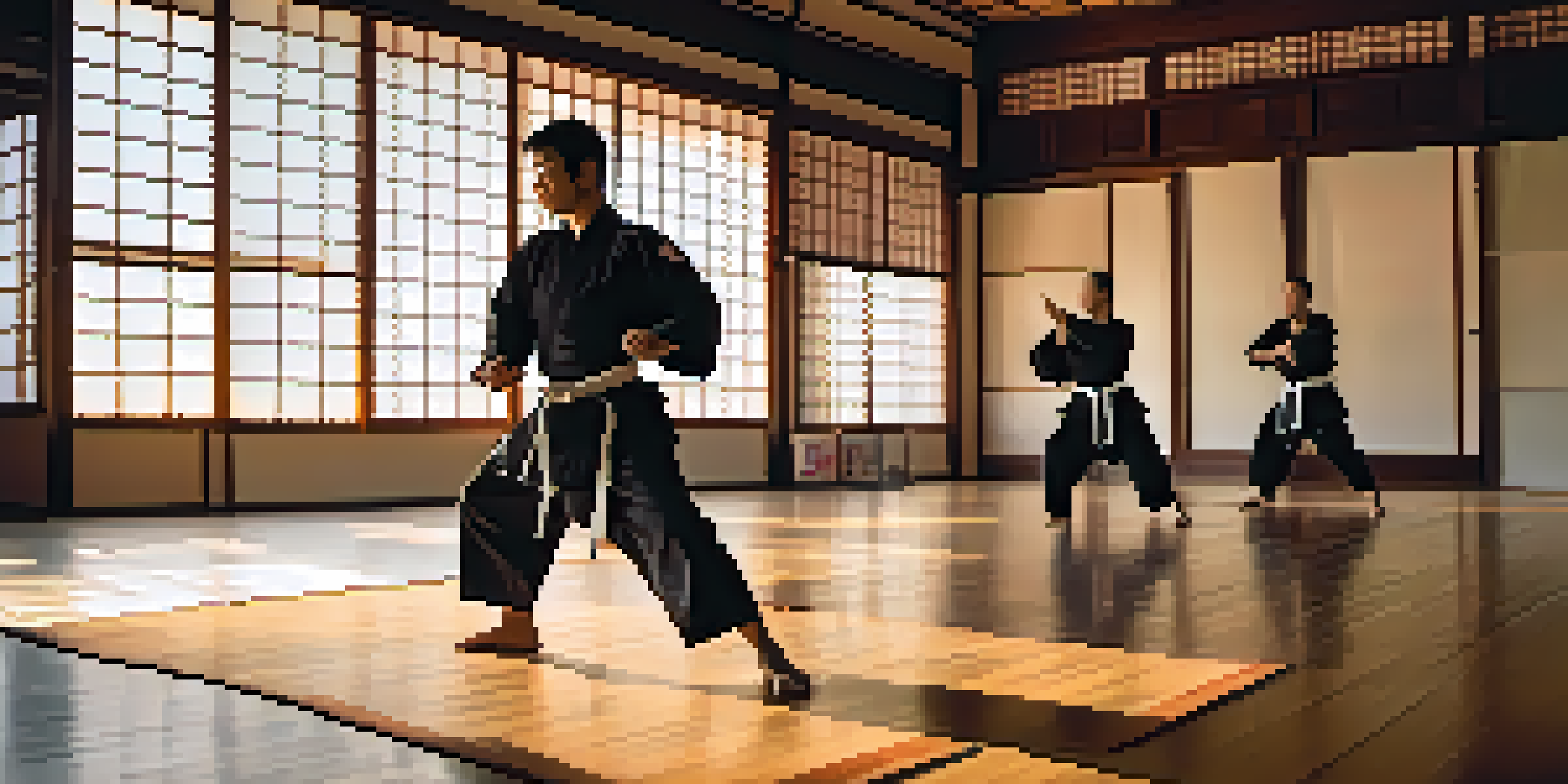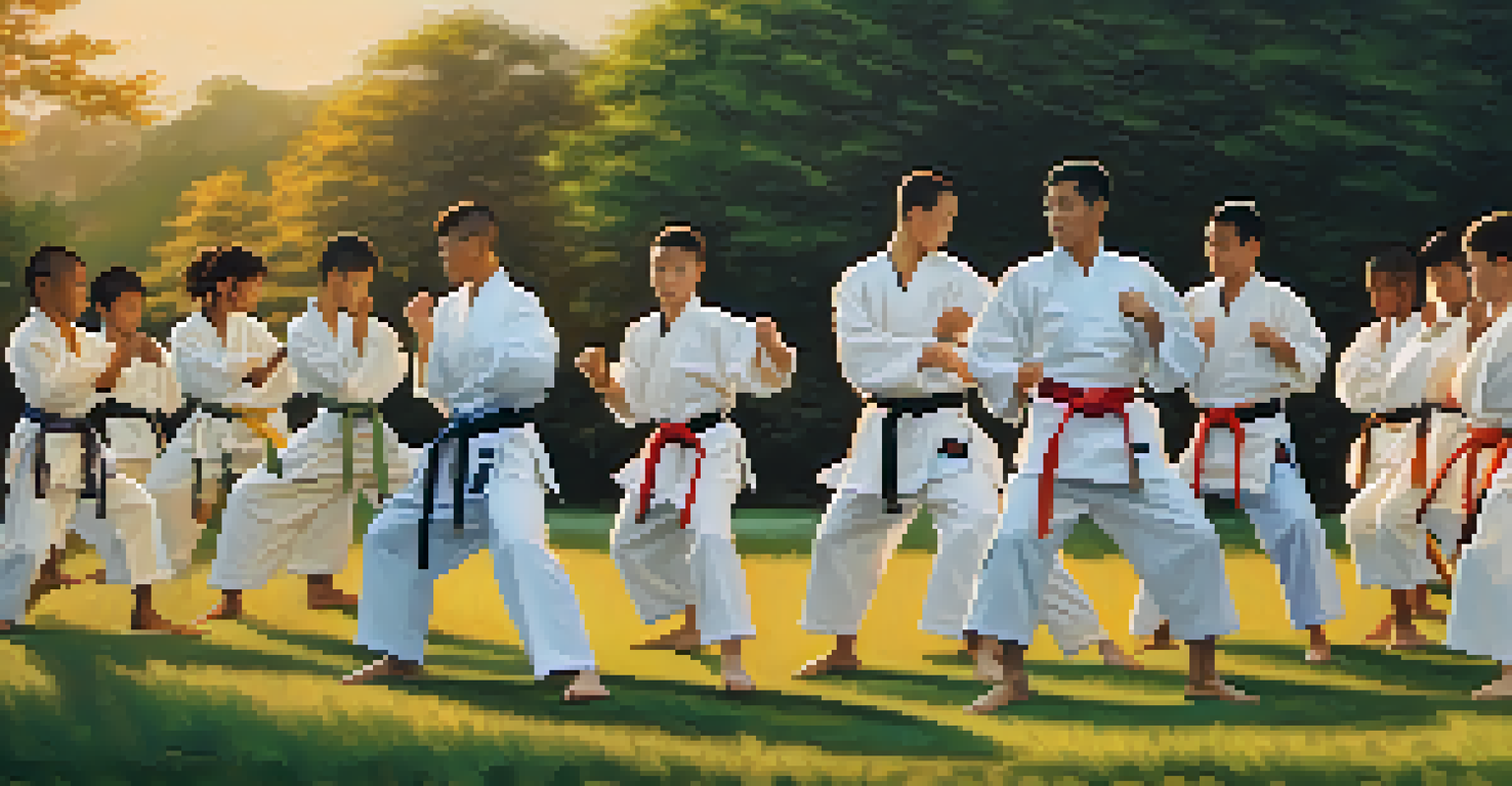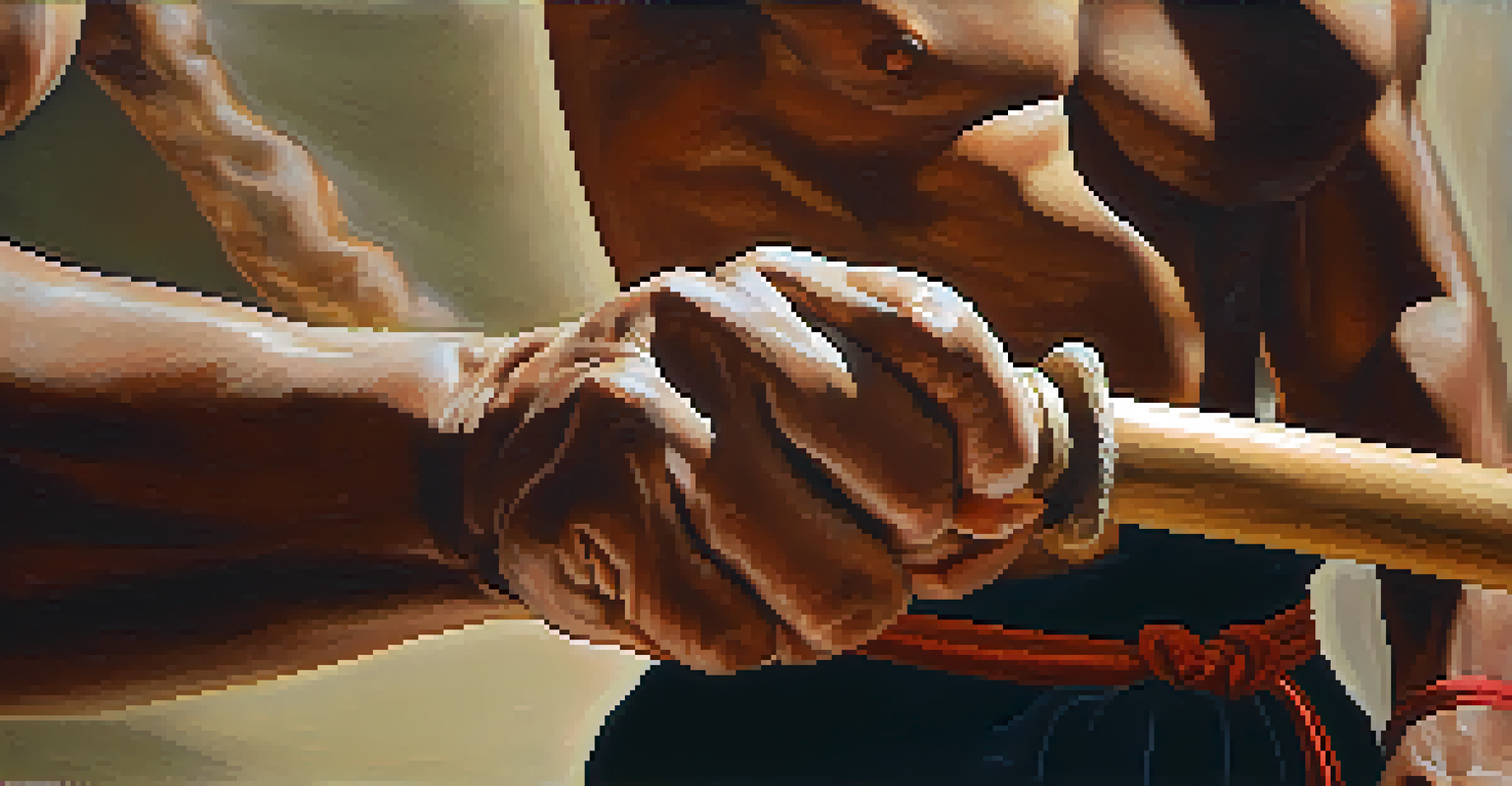How Martial Arts Influence Self-Discovery and Identity Formation

Understanding Self-Discovery Through Martial Arts
Martial arts provide a unique space for individuals to embark on a journey of self-discovery. Through rigorous training and discipline, practitioners learn not only physical techniques but also delve into their inner selves. This process often reveals hidden strengths and weaknesses, prompting a deeper understanding of one’s identity.
The ultimate aim of martial arts is not having to use them.
As students face challenges on the mat, they confront their fears, insecurities, and limitations. Overcoming these hurdles fosters resilience and self-confidence, essential components of personal growth. In this way, martial arts serve as a reflective mirror, allowing individuals to see who they truly are beneath the surface.
Moreover, martial arts cultivate mindfulness and presence. The focus required in practice encourages individuals to tune into their thoughts and emotions, facilitating a journey toward self-awareness. This heightened state of consciousness is pivotal in understanding one’s values, beliefs, and ultimately, personal identity.
The Role of Discipline in Shaping Identity
Discipline is a cornerstone of martial arts training and plays a vital role in identity formation. Adhering to a structured routine helps individuals develop a strong sense of commitment and responsibility. This newfound discipline often extends beyond the dojo, influencing other aspects of life, such as academics and career pursuits.

Through consistent practice, martial artists learn the importance of perseverance. Each belt earned represents not just a physical achievement, but a testament to the effort and dedication invested. This journey fosters a sense of pride and accomplishment, reinforcing a positive self-image and contributing to a more defined identity.
Self-Discovery Through Training
Martial arts provide a unique journey for individuals to uncover their strengths and weaknesses, fostering a deeper understanding of their identity.
Additionally, the discipline learned in martial arts can help individuals navigate life’s challenges with a more focused mindset. By setting goals and working diligently to achieve them, practitioners cultivate a stronger sense of self, making them more resilient in the face of adversity.
Building Confidence Through Skill Mastery
Mastering martial arts techniques significantly boosts self-confidence. As practitioners progress through their training, they gain a sense of competence that shapes their self-perception. This evolving skill set empowers individuals to trust in their abilities, which is crucial for forming a strong identity.
What lies behind us and what lies before us are tiny matters compared to what lies within us.
The journey to mastery is often filled with setbacks and failures, yet these experiences teach the value of persistence. Each time a student overcomes a challenge, they reinforce their belief in themselves. This newfound confidence spills over into everyday life, influencing how they perceive their capabilities in various situations.
Moreover, the supportive community found in martial arts schools fosters a sense of belonging. Training alongside peers who share similar goals creates a positive environment where individuals feel valued and accepted. This social aspect further enhances self-esteem and contributes to a well-rounded identity.
Embracing Vulnerability and Growth
Participating in martial arts encourages practitioners to embrace vulnerability. The practice often involves sparring and testing skills against opponents, which can be intimidating. Learning to accept and navigate these feelings helps individuals grow emotionally and mentally.
When students step onto the mat, they confront their limitations head-on. This process of pushing past perceived boundaries fosters personal growth and resilience. Accepting vulnerability not only enhances martial arts skills but also cultivates a deeper connection to self and a more authentic identity.
Discipline Shapes Identity
The structured training in martial arts instills discipline that extends beyond the dojo, influencing personal growth and resilience.
As practitioners learn to be comfortable with discomfort, they develop a more profound appreciation for their journey. This acceptance of vulnerability ultimately leads to a more self-compassionate approach, allowing individuals to embrace all facets of their identity—strengths and weaknesses alike.
The Influence of Culture and Tradition
Martial arts are steeped in rich cultural traditions that significantly influence identity formation. Each martial art has its unique history, philosophy, and values, which practitioners adopt as part of their training. This connection to tradition can help individuals find a sense of purpose and belonging.
As students engage with the cultural aspects of their chosen martial art, they often reflect on their own heritage and beliefs. This exploration can lead to a more profound understanding of one’s identity, as practitioners learn to appreciate the values that resonate with them personally.
Moreover, the rituals and customs inherent in martial arts training foster respect and discipline. By honoring these traditions, individuals cultivate a sense of responsibility towards their practice and community, further solidifying their identity within that context.
Creating a Sense of Community and Belonging
One of the most significant benefits of martial arts is the sense of community it fosters. Training alongside others who share similar passions creates bonds that can last a lifetime. This sense of belonging is instrumental in shaping one's identity, as individuals feel supported and understood in their journey.
The camaraderie built in martial arts schools promotes a culture of mutual respect and encouragement. As students cheer each other on through challenges, they learn the importance of collaboration and teamwork. This shared experience helps individuals feel less isolated, reinforcing their sense of self within a community.
Community Fosters Belonging
The supportive environment of martial arts schools creates lasting bonds, helping individuals feel understood and reinforcing their identity.
Additionally, the relationships formed in martial arts often extend beyond the dojo. Many practitioners find lifelong friends and mentors who guide them through various life stages, contributing to a richer, more nuanced identity. The community aspect of martial arts is a powerful reminder that individual growth is often intertwined with collective support.
Transforming Challenges into Strengths
Martial arts training is rife with challenges, both physical and mental, that can transform individuals in profound ways. By facing these obstacles, practitioners learn to view setbacks as opportunities for growth. This shift in perspective is crucial in developing a resilient identity.
As individuals navigate the ups and downs of martial arts, they cultivate a mindset that embraces challenges with determination. This resilience can translate into everyday life situations, allowing individuals to tackle personal and professional hurdles with confidence and grace.

Ultimately, the ability to turn challenges into strengths is a defining characteristic of a well-rounded identity. Practitioners learn that their journey is not solely about physical prowess but also about emotional intelligence and adaptability, making them more equipped to face life’s uncertainties.